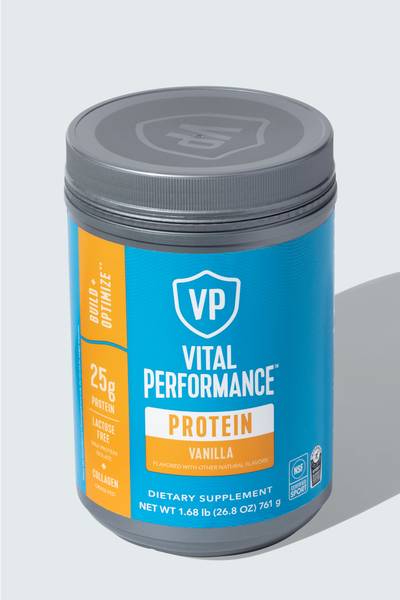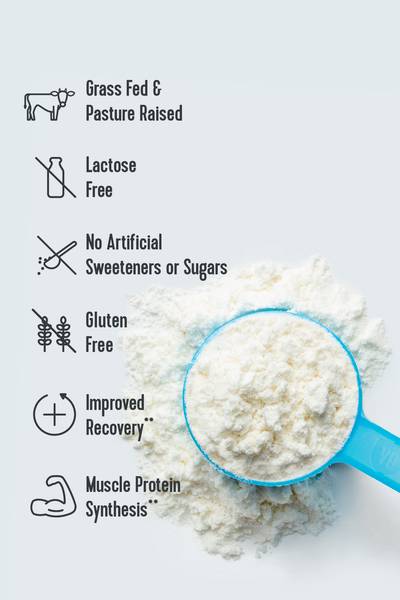If you've ever stepped foot in a weight room, you've probably heard talk of creatine. It's a substance that is naturally found in the muscles, responsible for giving muscles a much-needed boost during high-intensity workouts.**
"Creatine supplementation is used to increase the carrying capacity of fast-acting energy (ATP) in our muscles, this allows for longer bouts of high-intensity exercise lasting roughly 10 seconds," explains Sergio Pedemonte, a Certified Personal Trainer and the CEO of Your House Fitness.
With benefits such as these, no wonder most fitness junkies own a tub or two. But as widespread as creatine is, many people still don't know the basics. This includes when to take creatine and whether you should be taking it every day. Here, the fitness experts answer your most pressing questions.
Vital Note:This article has been made available for informational and educational purposes only. It is not intended to be a substitute for professional medical advice, diagnosis, or treatment. Always seek the advice of your physician or another qualified health provider with any questions you may have regarding a medical condition. Your licensed healthcare professional can best provide you with the diagnosis and treatment of any medical condition and assist you as well in deciding whether a dietary supplement will be a helpful addition to your regimen.
Is it best to take creatine before or after a workout?
So, when is the best time to take creatine? The problem is, Annie Williams, Qualified Personal Trainer and Nutritionist forOriGym Centre of Excellence, says that the fitness industry is divided.
With arguments for both, the answer to "is it best to take creatine before or after?" isboth.
"Taking it beforehand will ensure that the muscles have energy for the workout," explainsRobert Herbst, weight loss and wellness expert, personal trainer and World Champion powerlifter. “Taking it afterwards replenishes muscle energy stores and facilitates the post-exercise repair and growth."**
Related Articles
What is the proper way to take creatine?
While most workout supplements have a reputation for easy use, there's a bit more of a song and dance to taking creatine. Starting at the simple level, Herbst recommends dissolving creatine into plenty of water, along with eating a simple carbohydrate to raise blood sugar levels and cause an insulin response.
"Insulin has been found to aid the transport of creatine into muscle cells," Herbst tells Lively. On a more complex level that's ideal for advanced folks, the fitness experts recommend creatine loading.
Allow Sam Watson, a functional training specialist and fitness nutrition specialist, to explain: "Creatine loading is where you take a higher dose of creatine, around 20 to 25g a day for 5 to 6 days," she says. "The point of this is to quickly increase muscle creatine content levels so that you can reap the beneficial effects on performance sooner."
Without loading, i.e. taking the maintenance dose of 5g a day, it will take you around two to four weeks to reach the same level of muscle creatine content and start seeing benefits,** explains Watson.
"Therefore, the loading phase is unnecessary in the grand scheme of things," Watson says.
Pedemonte's personal favorite (and fastest) form of creatine loading is taking 5g of creatine every four hours, four times on the first day. "This regimen will fully saturate your creatine stores in one day and will allow for the full benefits of creatine** on your next training day," Pedemonte says.
After the creatine loading phase, Pedemonte says that a daily maintenance dose should be implemented.
When should you start taking creatine?
When your fitness goals are to gain muscle and build strength, creatine should never be too far behind. "It can be highly beneficial for those participating in some kind of resistance training as it may help increase lean mass,” says Watson.
Just be sure to focus on the other aspects of health – a healthy diet and enough sleep – for maximum results in your individual goals.
"If all basic forms of a healthy lifestyle are met, and you would like to increase your exercise performance, consider creatine supplementation," says Pedemonte. Thanks to its health benefits that extend beyond muscle gain and athletic performance, creatine is ideal for other purposes. For example, Williams says that taking creatine can improve heart health and cognitive function and minimize bone loss.**
Watson adds that those who are vegan or vegetarian benefit from taking it since they likely have lower levels of creatine as the result of no seafood and red meat in their diets. Interested in taking creatine? Add some extra oomph to your workouts with Vital Performance™ PRE. There are many delicious flavors to try, such as Watermelon Blueberry and Passion Fruit, and each flavor is made with creatine nitrate to boost your workouts.**
Should I take creatine every day?
"Creatine can be taken every day, even on rest days," says Lisa Richards, a Nutritionist and Author of The Candida Diet. "Taking creatine daily may increase your body's creatine levels more quickly and help aid in muscle gain."**
However, she says that timing is not as important on rest days as it is on days where you'll be working out. By being consistent with creatine, you are maintaining elevated creatine stores in the muscles. "To maintain this elevation, it is recommended that creatine is supplemented five times a week after the loading phase," explains Pedemonte.
Whether you decide to take a break from it, is up to you. "Some athletes stop taking it for a few days every eight weeks or so to let the creatine receptors in their cells clear and have the body regain sensitivity to it," adds Herbst. Finally, since creatine is a safe supplement, you can feel good about taking it daily. "You can introduce it into your lifestyle without the concern or risk of it affecting you or your health negatively," Williams tells Lively.
















